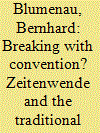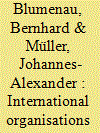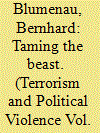|
|
|
Sort Order |
|
|
|
Items / Page
|
|
|
|
|
|
|
| Srl | Item |
| 1 |
ID:
189232


|
|
|
|
|
| Summary/Abstract |
On 27 February 2022, German Chancellor Olaf Scholz addressed the Bundestag and announced a watershed moment (Zeitenwende) for Germany's conduct of foreign affairs. Against the backdrop of the historical pillars of German foreign policy, this article reviews the core implications of the Zeitenwende doctrine. It analyses how the new policy continued or transformed traditional notions underpinning Germany's external relations: Westbindung (integration into the West) and European integration, multilateralism, the pursuit of a rules-based international order and NATO membership, hesitant leadership, Ostpolitik and Wandel durch Handel (transformation through trade), as well as a foreign policy not relying on military means. It argues that Zeitenwende represented a break with some traditional notions, such as Ostpolitik and Wandel durch Handel, and to some extent the non-military foreign policy. However, Zeitenwende also reconfirmed other traditions: Westbindung, a commitment to multilateralism and the rules-based order, as well as the reluctance to assert German leadership. With Zeitenwende, Germany remained firmly committed to the EU and NATO as the country acknowledged that it must do more for its own, and for Europe's, security. Zeitenwende represented Germany's coming to terms with, and final acceptance of, the realities of the post-Cold War European order.
|
|
|
|
|
|
|
|
|
|
|
|
|
|
|
|
| 2 |
ID:
132183


|
|
|
|
|
| Publication |
2014.
|
| Summary/Abstract |
This article looks at the European Communities' efforts against terrorism in the 1970s. It argues that in spite of the high ambitions to improve European legal integration, the attempts to develop an antiterrorism agreement were quite obviously a failure. Although the Dublin Agreement was adopted in 1979 after cumbersome and lengthy negotiations, it fell short of showing the member states' unity and resolve to fight terrorism, and it never entered into force. The tedious negotiations drained the member states' energy and willingness to such an extent that no other steps toward judicial integration or antiterrorism treaties were taken.
|
|
|
|
|
|
|
|
|
|
|
|
|
|
|
|
| 3 |
ID:
190974


|
|
|
|
|
| Summary/Abstract |
This article examines early antiterrorism negotiations within international organisations (IOs) and their outcomes. It assesses how international cooperation emerged in specialised, regional, and global IOs and provides a long-term overview from the 1960s until the late 1980s. Drawing on primary sources and scholarly literature, this article identifies the patterns, trends, and key characteristics of the successfully adopted measures. It demonstrates that early multilateral antiterrorism efforts faced several obstacles (sovereignty, national interests, mistrust, and geopolitics), and, therefore, international negotiations fared better when following a piecemeal approach within specialised or regional organisations, where the focus could be on specific aspects of terrorism (e.g., hostage-takings). A key characteristic of the successfully adopted antiterrorism instruments was the aut dedere aut iudicare principle, which allowed states to maintain perceptions of sovereignty by either extraditing or trying a suspect. The antiterrorism efforts examined here were mostly preventative in design and worked to discourage future terrorists by ensuring that safe havens were closed and that perpetrators faced justice. The shift to suicide terrorism in the 1990s would instead require new international antiterrorism efforts to focus on pre-emptive strategies, depriving terrorists of the means to carry out attacks. The roots of these measures were laid in the 1980s.
|
|
|
|
|
|
|
|
|
|
|
|
|
|
|
|
| 4 |
ID:
138786


|
|
|
|
|
| Summary/Abstract |
In the 1970s, Western European countries were hit hard by terrorism, especially by international terrorism that crossed borders easily and allowed terrorists of different origins to carry out attacks against both governments and people. Consequently, the necessity of fighting this menace also extended to international organisations. This article looks at how the Council of Europe dealt with the issue, and assesses the negotiations that led to the Convention on the Suppression of Terrorism from the German perspective. West Germany was very interested in establishing a sounder international legal framework against terrorism and thought that the Council of Europe would be able to make an important contribution by abolishing the political offence exception that had so far been a core feature of most extradition treaties. This clause allowed political criminals to escape punishment by fleeing to a country that would deny extradition to a different country on the grounds of the political nature of the act committed by the person in question. The article gives an account and analysis of the complex negotiations that finally resulted in the adoption of the Convention in 1977, as well as of the problems encountered and compromises reached during these negotiations.
|
|
|
|
|
|
|
|
|
|
|
|
|
|
|
|
| 5 |
ID:
172493


|
|
|
|
|
| Summary/Abstract |
This article, providing an example of state support for terrorists, looks at the cooperation between the Stasi and the right-wing West German terrorist Odfried Hepp in the 1980s. Based on research in Stasi archives, the article explains that gathering information, rather than using him as a terrorist weapon in the Cold War, was the main motivator for the Stasi to cooperate with a high-profile neo-Nazi. By looking at the details of the Hepp-Stasi alliance, it assesses what forms, results, and dangers this relationship produced. The article challenges the myth of the all-mighty East German State Security and demonstrates that the dynamics of this alliance were not always in the Stasi's favour. In the absence of other instruments of coercion, the Stasi used the personal relationship between Hepp and his officers to control him. The article offers insights into Hepps's terrorist career but also the pragmatic way in which the Stasi built its network of informants outside the GDR. It also adds nuances to the understanding of the relationship between Socialist states and terrorists during the Cold War.
|
|
|
|
|
|
|
|
|
|
|
|
|
|
|
|
|
|
|
|
|